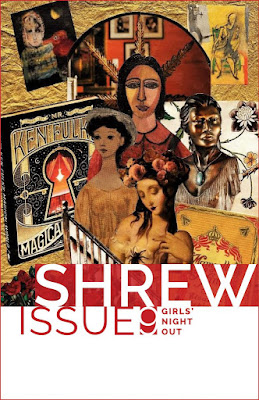Last year, I was invited to guest
edit an issue of Shrew Literary Magazine.
The editor/publisher, poet Joe Weil, whom you’ve met here on the blog, suggested
that I come up with a theme and then invite poets to submit their poems. I
decided that it might be fun to do a women’s issue based on the idea of “Girls’
Night Out.” The nine poets whom I invited (nine poets for Issue #9) wrote “night out”
poems that reflect a range of memories and experiences; while I was open to
loose interpretations of the theme, none of the poets chose to write about the
typical “girls’ night out” in which a group of women get together for a night
of shared fun. The “nights out” in all the poems I received are deeply
personal, rise from strong emotional centers, and are filled with layers of
meaning.
After the issue was published, a couple of men poets sent me "response" poems they had written that fit the idea of a night out. Although “girls’ night out” may be a more common phrase, guys have nights out too. It occurred to me that a girls’/guys’ night out poem might be fun for you to work with.
After the issue was published, a couple of men poets sent me "response" poems they had written that fit the idea of a night out. Although “girls’ night out” may be a more common phrase, guys have nights out too. It occurred to me that a girls’/guys’ night out poem might be fun for you to work with.
Some Possible Topics:
1. the obvious “night out” with the girls or with the guys
2. a “night out” on your own
3. a tryst (long ago or recent)
4. a chance meeting while out one night
5. a symbolic or metaphorical “night out”
6. a spiritual “night out”
7. a dream “night out” (based on a real or made up dream)
8. the food you ate on a particular "night out"
9. a "night out" at a mall
10. a nighttime walk that was more than a walk
Suggestions:
1. For this prompt, simply think about a night out that made a particular impression on you or that impacted your life in a special way (good or not-so-good).
2. Free write for a while, stop, and then take a look at what you’ve written.
3. Work parts of your free write into a poem.
Tips:
1. Tell about your experience without “telling” too much. Don't be over-generous with details.
2. Think in terms of the following:
Content/Story
Imagery
Meaning
Mood
Figurative Language (similes,
metaphors, etc.)
Line Breaks
Sound Value
3. Importantly, be clear about the story you tell and the point you want to make. Why tell this story? What’s the message behind the story? Is there an obvious subject and one that is less obvious? This second, deeper subject may inform and even compete the more apparent subject.
4. There should be a sense of intimacy in your poem, a revealing of something you’ve never exposed before.
5. Is there anything in your poem (a sense of revelation or of mystery perhaps) that may make both you and your readers a little uncomfortable or at least a bit fidgety? Fidgety, BTW, can be a good thing!
6. What impression and meaning do you want your readers to take away from the poem? How does your poem "situate" the human condition?
Examples:



No comments:
Post a Comment